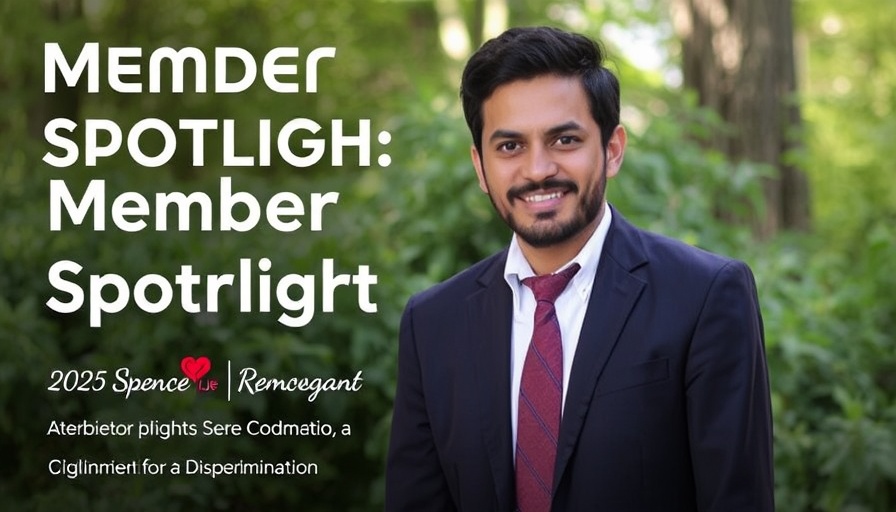
Understanding Identity: The Personal Journey of Juan Del Toro
In the realm of mental health and societal experiences, personal narratives often hold the power to enlighten and transform perspectives. The compelling story of Juan Del Toro, a 2025 Spence Awardee, is a testament to this fact. Del Toro's exploration of his identity not only addresses the inherent challenges linked to societal expectations but also sheds light on the distressing effects of discrimination, which are prevalent in many communities today.
The Effects of Discrimination on Mental Health
Discrimination can lead to various mental health issues, including anxiety disorders, depression, and chronic stress, amplifying feelings of isolation and hopelessness. Del Toro emphasizes the intersection of identity and mental well-being, illustrating how societal prejudices can exacerbate symptoms such as panic attacks and social anxiety. Such experiences are particularly resonant for marginalized groups, where cultural stigma surrounding mental health can impede access to necessary resources like therapy and counseling.
Breaking Down Stigma and Advancing Mental Health Awareness
Del Toro's work exemplifies the urgent need for stigma reduction initiatives in mental health. By sharing personal experiences, individuals can foster understanding and empathy within their communities, ultimately promoting mental health awareness. Campaigns designed to educate the public about anxiety symptoms, coping strategies, and the importance of seeking help—be it through medication or therapy—are essential. Groups such as SADAG (South African Depression and Anxiety Group) provide crucial support and information for those navigating anxiety and its many facets, from social impacts to healthcare access.
Strategies for Mental Health Support: Insights and Tools
To combat the pervasive challenges outlined in Del Toro's narrative, it is vital to empower individuals with effective coping strategies. Incorporating mindfulness practices, such as yoga for anxiety and breathing exercises, can significantly enhance resilience. Furthermore, promoting community outreach and school-based mental health programs ensures that young individuals receive the support they need. Digital mental health resources like therapy apps can also play a pivotal role by offering accessible methods to manage mental wellness, particularly vital in a post-COVID-19 world.
The Road to Recovery: Embracing a Holistic Approach
Del Toro’s journey also highlights the importance of family support and traditional healing approaches in mental health recovery. Combining modern therapeutic techniques with cultural practices can yield powerful healing. For instance, integrating nutritional strategies and exercise into treatment plans can bolster mental health significantly. Through resilience building and emotional intelligence training, we can foster environments that nurture rather than stifle, creating pathways for recovery and growth.
Exploring Future Opportunities for Mental Health Advocacy
As Del Toro continues his advocacy, there is a growing recognition of the need for comprehensive mental health policies. Attention to socioeconomic factors and healthcare access is essential for crafting a future that prioritizes mental well-being across demographics. Initiatives that encourage early intervention and prevention strategies will pave the way for healthier communities. By advocating for mental health funding and policy reform, we can protect patient rights and expand access to critical resources.
Ultimately, Juan Del Toro’s experiences underscore the significance of sharing personal stories. These narratives have the potential to illuminate paths for others, mitigated by anxiety and stress. As we engage in these conversations, we can foster a broader understanding of mental health and encourage those in need to embrace available resources. Together, we can build a society that promotes well-being, support, and resilience.
Take Action: Support Mental Health Awareness Initiatives
If you or someone you know struggles with mental health issues, consider reaching out to local support groups, including those facilitated by mental health organizations. Explore resources available for coping with anxiety, and actively engage in the advocacy for mental health policies that drive change. Your engagement can have a ripple effect in fostering a healthier community.
 Add Row
Add Row  Add
Add 




 Add Row
Add Row  Add
Add
Write A Comment